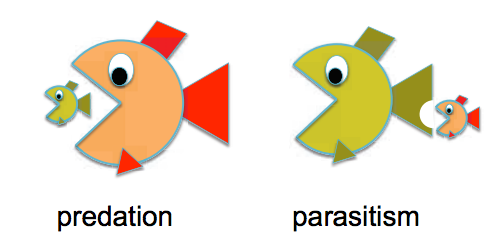Good question.
There is no fundamental difference between parasites and predators.
Ecological Interaction
In terms of ecological interaction, they are both defined as an interaction where one species benefits and the other suffers from the interaction.
Intuition parasite vs predator
In general predation is viewed as a big individual eating a smaller one while parasitism is when a small individual eats a bigger one. These general intuition however fails to consider a number of cases. Here some cases I can think of
Examples when intuition don't match the above picture
Generally considered as predation but does not fit the above picture-based definition:
- social animals attacking in groups preys that are much larger than themselves - non-social animal attacking prey larger than themselves
- herbivores browsing on large trees
Generally considered as parasitism but does not fit the above picture-based definition:
- indirect effect of habitat modification that would rather be considered as parasitism.
- Species that take advantage of parental care of another species by mimicking babies (but being larger)
- Individuals of large species stealing the habitat built by a smaller species
- Batesian mimicry (see this postthis post; Thank you @WYSIWYG and @NL_Derek for the comments)
Population culture vs science literature
In the popular culture, some people call parasites only endoparasites. This concept is also misleading and not so much in accordance with the general literature in biology.

